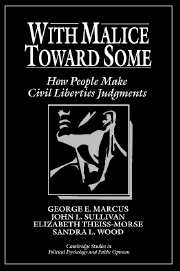Book contents
- Frontmatter
- Contents
- List of Figures and Tables
- Preface: Political Tolerance and Democratic Life
- PART I Theoretical Background and Overview
- 1 Political Tolerance and Democratic Practice
- 2 Antecedent Considerations and Contemporary Information
- 3 Thinking and Mood
- PART II Contemporary Information and Political Tolerance Judgments
- PART III Refining the Model – The Role of Antecedent Considerations as Individual Differences
- PART IV Implications and Conclusions
- Appendix A: Hypothetical Group Scenarios and Manipulations
- Appendix B: Methodological Approaches and Scales
- Notes
- References
- Index
2 - Antecedent Considerations and Contemporary Information
Published online by Cambridge University Press: 05 August 2012
- Frontmatter
- Contents
- List of Figures and Tables
- Preface: Political Tolerance and Democratic Life
- PART I Theoretical Background and Overview
- 1 Political Tolerance and Democratic Practice
- 2 Antecedent Considerations and Contemporary Information
- 3 Thinking and Mood
- PART II Contemporary Information and Political Tolerance Judgments
- PART III Refining the Model – The Role of Antecedent Considerations as Individual Differences
- PART IV Implications and Conclusions
- Appendix A: Hypothetical Group Scenarios and Manipulations
- Appendix B: Methodological Approaches and Scales
- Notes
- References
- Index
Summary
The historical processes and events that have shaped a person's complex make-up can never be fully unraveled. Nevertheless, our task is not hopeless. A person's current behavior must be determined by factors that exert their effects right here and now. Past events are important only to the extent that they have left an enduring mark on the person, a mark that continues to wield its impact.
Icek Ajzen,Attitudes, Personality, and BehaviorIn this chapter, we introduce the conceptual framework that guides our analysis of tolerance judgments. At the most general level, we attempt to distinguish between long-term and short-term influences on these judgments. We will review briefly some theoretical approaches that have emphasized long-term influences and others that emphasized short-term influences. We then introduce the concepts we use to analyze the role of established convictions and more immediate environmental influences. Finally, we apply these conceptual distinctions to the existing literature on political tolerance.
For years scholars have studied long-term and short-term influences on political attitudes and behavior. Yet there is little agreement about the relative importance of these two sets of influences in shaping citizens' opinions and behaviors. On the one hand, the symbolic politics literature and personality studies emphasize the effects of early socialization. On the other hand, the rational choice and social cognition literatures pay greater attention to the role of information stemming from people's more immediate circumstances.
- Type
- Chapter
- Information
- With Malice toward SomeHow People Make Civil Liberties Judgments, pp. 15 - 38Publisher: Cambridge University PressPrint publication year: 1995



